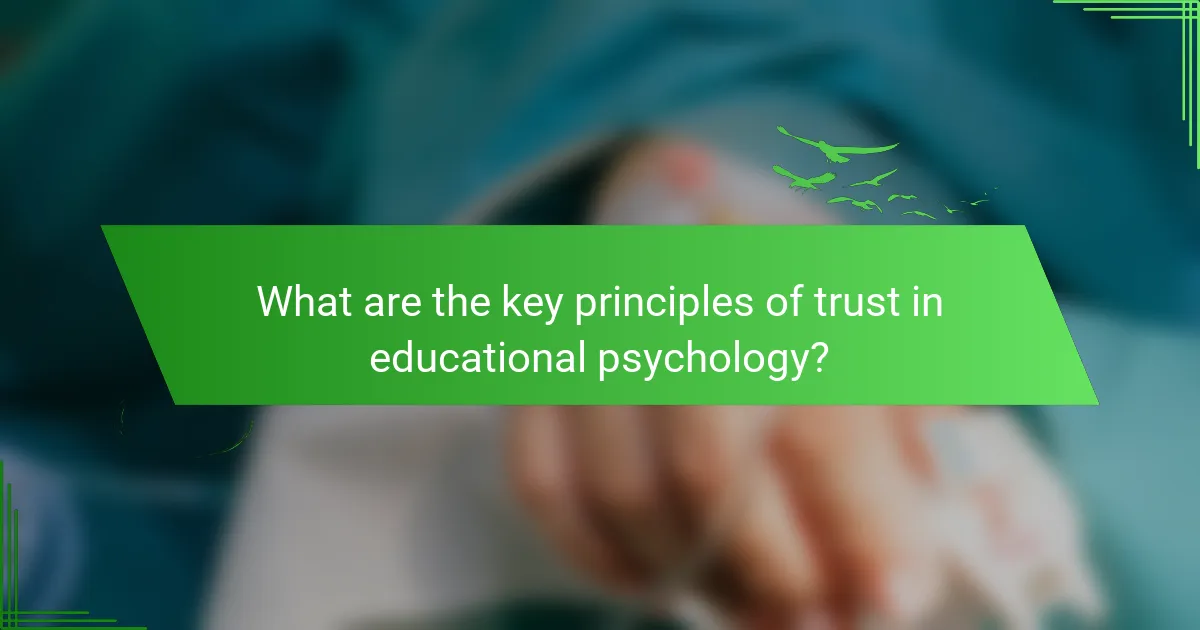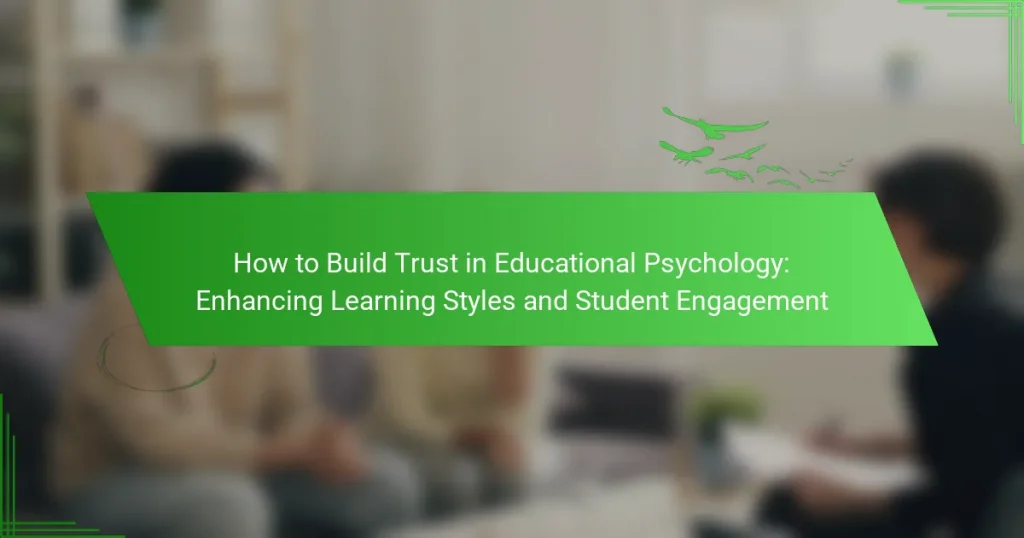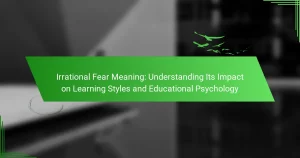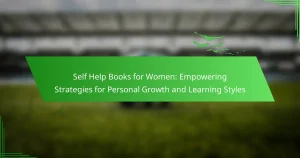Building trust in educational psychology is essential for enhancing student engagement and accommodating diverse learning styles. This article explores the principles of transparency, consistency, and empathy. It discusses strategies for fostering open communication and establishing a safe environment. Lastly, it highlights the importance of active listening and reliable feedback in building strong educator-student relationships.

What are the key principles of trust in educational psychology?
Building trust in educational psychology involves transparency, consistency, and empathy. These principles enhance student engagement and cater to diverse learning styles. Transparency fosters open communication, allowing students to feel secure in sharing their thoughts. Consistency in expectations and feedback builds reliability, which is crucial for trust. Empathy enables educators to connect with students, acknowledging their individual experiences and challenges. By integrating these principles, educators can create a supportive learning environment that enhances both trust and educational outcomes.
How does trust impact student engagement?
Trust significantly enhances student engagement by fostering a supportive learning environment. When students feel trusted, they are more likely to participate actively and take academic risks. Research shows that trust promotes open communication, leading to improved collaboration and motivation among students. In educational psychology, building trust involves demonstrating consistent support, understanding individual learning styles, and creating a sense of belonging. Consequently, trust becomes a unique attribute that directly correlates with higher levels of student engagement.
What role does learning style awareness play in building trust?
Learning style awareness fosters trust by acknowledging individual preferences, enhancing communication, and promoting a supportive environment. When educators recognize diverse learning styles, they validate students’ identities, creating a sense of belonging. This approach encourages open dialogue, allowing students to express needs and concerns. Trust builds as educators adapt strategies that align with students’ unique attributes, leading to increased engagement and motivation. Ultimately, understanding learning styles transforms the educational experience, fostering a collaborative atmosphere that strengthens trust between students and educators.
Which learning styles are most prevalent among students?
Visual and kinesthetic learning styles are most prevalent among students. These styles emphasize the importance of engaging students through visual aids and hands-on activities. Research indicates that approximately 65% of students identify as visual learners, while around 30% prefer kinesthetic methods. Engaging these learning styles enhances overall student trust and motivation in educational settings.
How can educators identify individual learning styles?
Educators can identify individual learning styles through observation, assessments, and student feedback. By analyzing how students engage with material, teachers can tailor their approaches to meet diverse needs.
Common methods include administering learning style inventories, conducting informal assessments, and encouraging students to express their preferences. These strategies help educators recognize unique attributes that enhance student engagement and learning outcomes.
For example, auditory learners may benefit from lectures and discussions, while visual learners may thrive with diagrams and videos. As a result, personalized learning experiences can significantly improve educational effectiveness.
What are the universal attributes of effective trust-building strategies?
Effective trust-building strategies in educational psychology emphasize transparency, consistency, and empathy. These universal attributes foster strong relationships between educators and students. Transparency involves open communication about expectations and goals, promoting a sense of safety. Consistency in actions and messaging reinforces reliability, encouraging students to engage more deeply. Empathy allows educators to understand and address individual student needs, enhancing their learning experience. Together, these attributes create a supportive environment that nurtures trust and boosts student engagement.
How can clear communication foster trust?
Clear communication fosters trust by ensuring transparency and understanding between educators and students. When students feel informed, they are more likely to engage and participate actively in their learning process. Effective communication builds a supportive environment where students can express their thoughts and concerns without fear. This approach enhances the educational experience, leading to improved learning outcomes and stronger relationships. As a result, trust becomes a foundational element in the educational psychology context, promoting collaboration and mutual respect.
What is the significance of consistency in educator behavior?
Consistency in educator behavior is crucial for building trust with students. It fosters a stable learning environment where students feel secure and valued. When educators consistently apply rules and expectations, students are more likely to engage and participate actively in their learning. This reliability enhances the educator-student relationship, promoting better communication and collaboration. Research indicates that consistent educator behavior positively influences student motivation and academic performance, reinforcing the significance of trust in educational psychology.
What unique approaches enhance trust in diverse learning environments?
Building trust in diverse learning environments requires unique approaches that foster open communication and mutual respect. Collaborative learning activities enhance engagement, allowing students to share experiences and perspectives. Culturally responsive teaching practices build rapport by recognizing and valuing students’ backgrounds. Regular feedback mechanisms create transparency, encouraging students to voice concerns and contribute to a supportive atmosphere. Lastly, establishing clear expectations and consistent behavior fosters reliability, reinforcing trust among students and educators.
How can personalized feedback strengthen trust?
Personalized feedback strengthens trust by demonstrating individual care and attention. When educators provide tailored insights, students feel valued and understood. This approach fosters a supportive learning environment, enhancing engagement and motivation. Research indicates that personalized feedback significantly improves student performance and satisfaction, reinforcing trust in the educational process.
What innovative techniques can be employed to engage students?
Innovative techniques to engage students include interactive learning, gamification, and personalized feedback. These methods enhance student participation and cater to diverse learning styles. Interactive learning fosters collaboration through group projects. Gamification incorporates game elements to motivate students. Personalized feedback provides tailored guidance, improving learning outcomes.
What rare attributes contribute to exceptional trust-building?
Empathy, transparency, and consistency are rare attributes that significantly enhance trust-building in educational psychology. Empathy fosters a deeper connection between educators and students, allowing for tailored learning experiences. Transparency in communication builds credibility, ensuring students feel informed and valued. Consistency in actions and expectations reinforces reliability, creating a stable learning environment that encourages student engagement.
How does vulnerability in teaching enhance student relationships?
Vulnerability in teaching fosters deeper student relationships by promoting authenticity and trust. When educators share their challenges, students feel more connected and understood. This openness encourages a safe learning environment, enhancing engagement and collaboration. Research indicates that trust significantly boosts student motivation and academic performance. In essence, vulnerable teaching practices create a supportive atmosphere that nurtures student development and fosters lasting connections.
What are the effects of empathy on student trust?
Empathy significantly enhances student trust by fostering emotional connections and creating a supportive learning environment. When educators demonstrate understanding and compassion, students feel valued and secure, which promotes open communication and engagement. Research indicates that empathetic interactions lead to higher levels of student satisfaction and motivation, ultimately improving academic performance. Additionally, trust established through empathy encourages students to take intellectual risks, enhancing their learning experiences.

How can educators apply trust-building strategies in practice?
Educators can apply trust-building strategies by fostering open communication and demonstrating reliability. Establishing a safe environment encourages students to express themselves. Consistent feedback and support reinforce trust, enhancing student engagement. Building relationships through active listening and empathy further strengthens connections.
What are the best practices for fostering trust in the classroom?
Building trust in the classroom requires consistent communication, respect, and transparency. Establish clear expectations and actively listen to students. Foster a supportive environment by encouraging collaboration and valuing diverse opinions. Regular feedback enhances engagement and reinforces trust. Implementing these practices cultivates a positive learning atmosphere, promoting student success.
What common mistakes should educators avoid when building trust?
To build trust effectively, educators should avoid common mistakes that undermine relationships with students. Failing to listen actively can lead to misunderstandings. Inconsistent communication creates confusion and erodes trust. Showing favoritism alienates students, while a lack of transparency about expectations fosters skepticism. Neglecting to follow through on commitments can damage credibility. Lastly, ignoring feedback prevents growth and trust-building.
How can educators continuously improve their trust-building efforts?
Educators can continuously improve their trust-building efforts by fostering open communication and demonstrating consistency. Establishing regular feedback loops enhances transparency and shows students their voices matter. Additionally, incorporating personalized learning approaches can strengthen relationships, as students feel valued and understood. Engaging in professional development focused on emotional intelligence equips educators with skills to better connect with students. These strategies create a supportive environment, enhancing trust and promoting student engagement.
What expert insights can guide trust enhancement in educational psychology?
Building trust in educational psychology requires expert insights that emphasize transparency, consistency, and empathy. Establishing clear communication between educators and students fosters a supportive environment. Techniques such as active listening and personalized feedback enhance engagement and validate student experiences. Research shows that when students feel understood, their motivation and academic performance improve significantly. Implementing trust-building strategies leads to a more positive learning atmosphere, ultimately enhancing educational outcomes.




